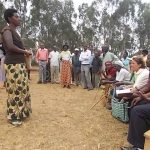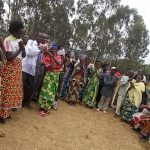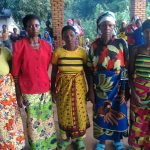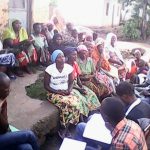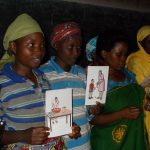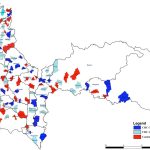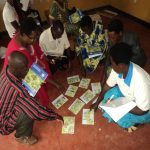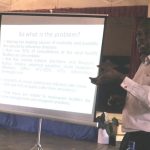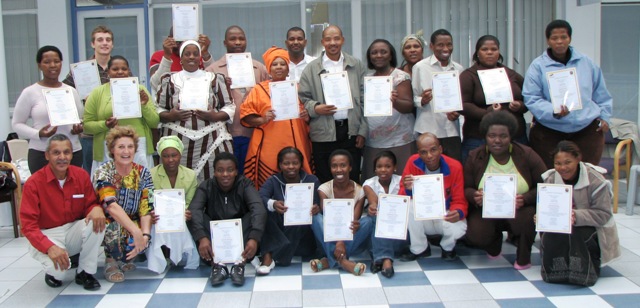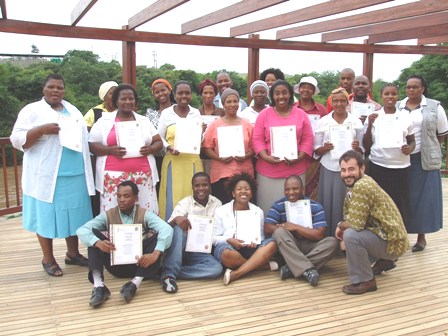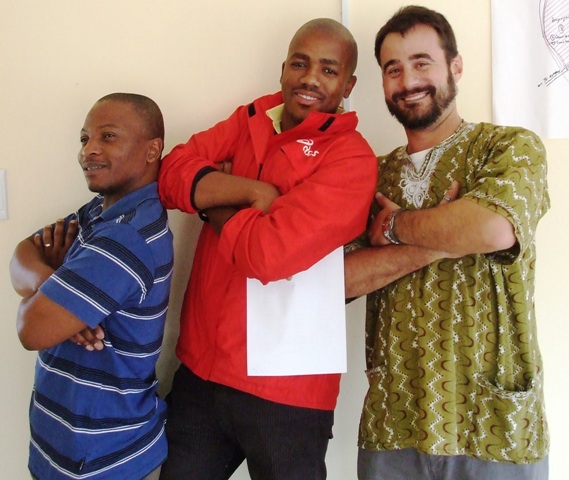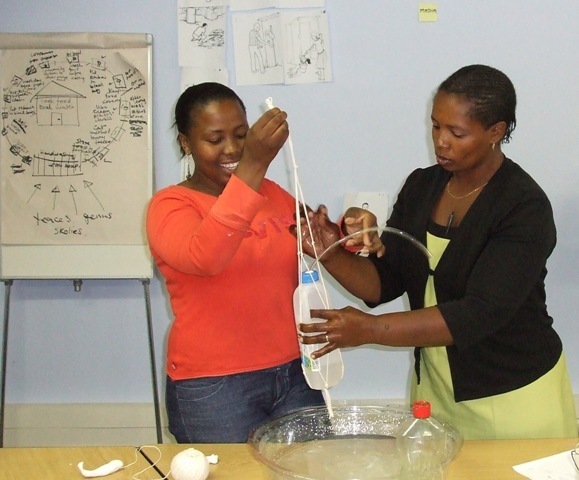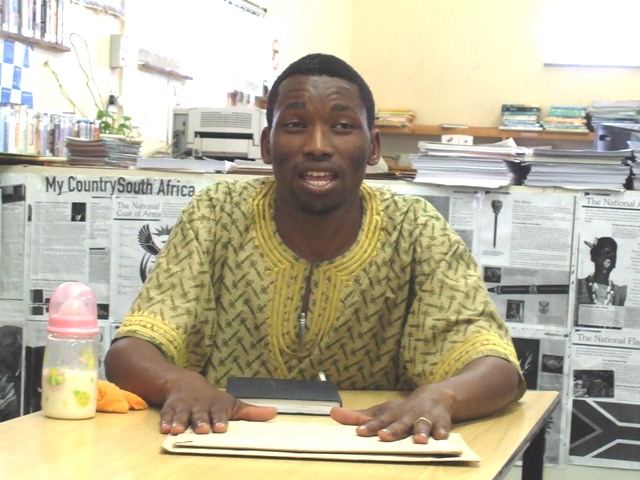RWANDA
LOCATION OF RWANDA
| Demographcs | Rwanda |
| Population | 9 million |
| GNI /per capita | US$860 |
| % urbanisation | 19% |
| Under 5 mortality rate/1000 births | 160 |
| Life expectancy | 52 |
| improved water | 74% |
| improved sanitation | 42% |
| deaths per year (2004) | 16,700 |
| DALYs/1000 cap/yer | 62 |
| DALYs /1000 cap (13- 289 high) | 183 |
| WASH deaths per year (2004) | 48,100 |
| WASH deaths % total burden | 31% |
| Diarrhoea rate/1000 (0.2 low – 107 high) | 65 |
| ARI rate (0.1 lowest)/1000 | 39 |
| Malnutrition (% stunting)/1000 | 52% |
| Malaria /1000 | 13 |
| Human Devlopment Index (2011) | 0,429 |
| Ranking in World (2011) | 166 |
DISTRICT COVERAGE OF COMMUNITY HEALTH CLUBS
COVERAGE OF DISTRICTS (April, 2015)
Community Health Clubs are established in ALL of the 30 Districts in Rwanda. In addition 98% of all 14,767 villages in Rwanda have registered CHCs. This means that the Club has a name and an elected Executive Committee, and registered Members. However health sessions are not ongoing because the village health workers lack training and a training tool kit. This is due to lack of support by NGOs for MoH.
There are 5,376 villages out of 14,767 villages have operational CHCs. (36% of the all of the villages in Rwanda). This means they have trained Village Health Workers (ASOC) who are running health sessions regularly.
IMPLEMENTING PARTNERS OF CBEHPP
- RFHP/ USAID
- SNV / UNICEF
- Tearfund / Scottish Government
- AVSI
- World Vision
- STPH / SDC
- Nyamata Hospital / Various
- Multiple
- Africa AHEAD/Gates Foundation
AFRICA AHEAD - RWANDA
HEAD OFFICE
RANDOMISED CONTROL TRIAL OF THE CHC MODEL
IN RUSIZI DISTRICT
In 2009, Africa AHEAD brought the CBEHPP to the attention of leading funding Agencies in USA, because Rwanda is the only country worldwide to have taken up the CHC model at national level. Thanks to this advocacy, the Bill & Melinda Gates Foundation (BMGF) agree to help MoH to monitor and evaluate the efficacy of the the CHC to reduce common preventable diseases. Rusizi District in Western Province, was selected to demonstrate the ‘Classic’ CHC Model.
Within three years, 150 CHCs will have completed health and hygiene training that will benefit 15,000 direct CHC members (average of 100 members per Club) and an estimated 75,000 direct beneficiaries (5 family members on average per household) with significantly improved hygiene facilities and behavioral practices in the home.
A randomised control Trial being undertaken by Innovation for Poverty Action (IPA) was contracted to monitor the CHC model over three years. They will determine precisely how hygiene behavior can be improved to reduce the national disease burden in Rwanda and similar countries. This will provide the first independent rigorous research of the CHC approach and will therefore be an important contribution to the international effort to identify the most cost-effective method to achieve sustainable and replicable hygiene behavior change at scale.
PROPOSALS READY FOR FUNDING
- Strengthening and Monitoring the Community-Based Environmental Health Promotion Programme (CBEHPP) in Karongi, Kirehe, Nyagatare, Nyaruguru & Rutsiro Districts (2014 – 2016).
- Increasing Rwandan Secondary School Graduation Rate (Esp. Among Girls), Teacher Effectiveness and 21st Century Employment-Relevant Skills in Rusizi District, Rwanda (one year)
- The Micro-Enterprise Model for Self Sustainability though Digital Marketing in Community Health Clubs in Rwanda (two years)
THE COMMUNITY BASED ENVIRONMENTAL HEALTH PROMOTION PROGRAMME (CBEHPP)
The Community Based Environmental Health Promotion Programme (CBEHPP) is a national hygiene behaviour change program in Rwanda that has adopted the Community Health Club (CHC) methodology, which was endorsed by the president who directed that it should be extended to every village in the country. This was made policy in the Health Sector Strategic Strategy in 2011. By 2015 the program was well established but there was much training to be done to complete the 56% of villages still outstanding. At the CBEHPP Workshop, the Director General of MoH confirmed that by June 2018, MoH wants total (100%) coverage of CHCs across all villages and households in Rwanda.
CBEHPP utilises cascading training from a MoH national core of trainers to train Sector Environmental Health Officers (SEHOs) based at health centres who then train community health facilitators (CHFs) at the village level. Once trained CHFs set up Community Health Clubs (CHCs) with the target of around 100 households. Each household in the village should be represented by at least one member at the CHC.
CBEHPP combats the prevailing environmental health threats to the Rwandan population plus the achievement of national and global development targets as listed in the Roadmap.
- Improved household and institutional hygiene practices
- Safe excreta disposal with zero open defecation (ZOD) and hygienic use of toilets / latrines
- Hand-washing with soap and water at critical times
- Safe drinking water handling
- Safe disposal of solid and liquid wastes
- Food safety and improved nutrition
- Minimise indoor air pollution to reduce Acute Respiratory Infections (e.g. promote fuel-efficient stoves with chimneys)
- Improved vector control
FEATURED ARTICLES
NEW WEBSITE FOR REGISTERING CHCS
UNICEF SOLIDLY BEHIND CHC SCALE UP IN RWANDA
INTERVIEW WITH NEW COUNTRY DIRECTOR RWANDA
NATIONAL WORKSHOP TO SCALE UP CHC IN RWANDA
TRAINING MATERIAL
DOWNLOAD MANUALS FOR CBEHPP
DOWNLOAD VISUAL AIDS FOR CBEHPP
AFRICA AHEAD IN RWANDA
2008 – 2010:
Advocacy for CHC Model and Development Road Map for CBEHPP, WSP- World Bank for Ministry of Health (Anthony Waterkeyn)
2010-2012:
Development of CBEHPP Training Materials and Manuals for CBEHPP for MoH / Unicef (Juliet Waterkeyn)
2013-2016:
Monitoring Behaviour Change and Improved Health Outcomes through the Community Hygiene Club Methodology in Rwanda – funded by Bill & Melinda Gates Foundation

Regional Representative: Zachary Bigirmana
Country Director: Joseph Katabarwa
Programme Manager: Amans Ntakarutimana
Monitoring Officer: Andrew Ndahiro
Finance Officer: Jeanne Gasengayire
Data Management Officer: Etienne Havumiragira
Consultants:
Anthony Waterkeyn, Africa AHEAD Director of Programmes
Dr. Juliet Waterkeyn, Research and Training Advisor

I am text block. Click edit button to change this text. Lorem ipsum dolor sit amet, consectetur adipiscing elit. Ut elit tellus, luctus nec ullamcorper mattis, pulvinar dapibus leo.

I am text block. Click edit button to change this text. Lorem ipsum dolor sit amet, consectetur adipiscing elit. Ut elit tellus, luctus nec ullamcorper mattis, pulvinar dapibus leo.

I am text block. Click edit button to change this text. Lorem ipsum dolor sit amet, consectetur adipiscing elit. Ut elit tellus, luctus nec ullamcorper mattis, pulvinar dapibus leo.

I am text block. Click edit button to change this text. Lorem ipsum dolor sit amet, consectetur adipiscing elit. Ut elit tellus, luctus nec ullamcorper mattis, pulvinar dapibus leo.

I am text block. Click edit button to change this text. Lorem ipsum dolor sit amet, consectetur adipiscing elit. Ut elit tellus, luctus nec ullamcorper mattis, pulvinar dapibus leo.
Register your CHC.
Contact us using the form below.

